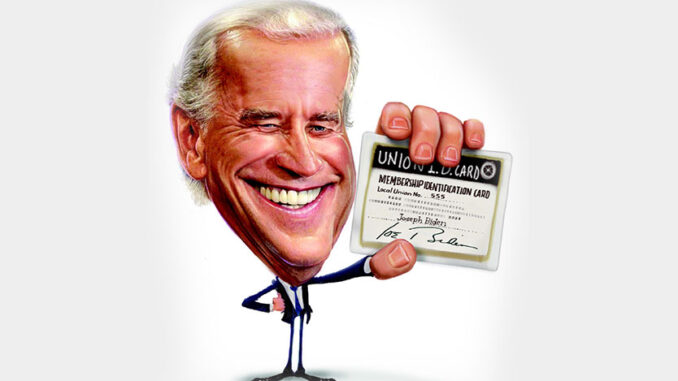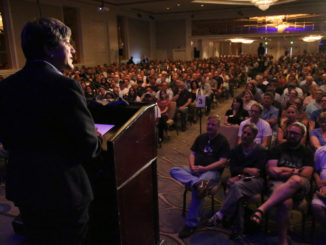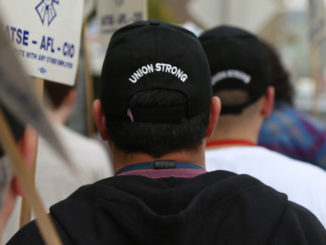
IN A DIVISIVE PRESIDENTIAL CAMPAIGN, ONE LABOR ISSUE STANDS OUT
By Kim Kelly
Several months out from when it first made its grand appearance on the world stage, the coronavirus pandemic has laid bare a great number of the structural defects built into the American way of life. From the country’s woefully wretched healthcare system to the political elite’s callous lack of care for the poor and homeless, the way the U.S. does business has never allowed much breathing space for the workers who actually keep things running. As wave after wave of layoffs hit the workforce and unemployment numbers soar to hitherto unimaginable heights, it’s also become readily apparent that no one else is looking out for the working person in this country. All we have is each other and the collective efforts that spring up when we pool our resources — and resourcefulness. This is a critical moment for labor, and workers have made their feelings about it known with an escalating series of strikes, sickouts, petitions, and protests held in concert with countless new organizing campaigns. However, thanks to the current state of the U.S. government and its labor laws, many of those campaigns will face an uphill battle for recognition because of unnecessary added steps intended to stymie worker power.
During such uncertain times as these, strong unions are a worker’s best friend, and it is absolutely imperative to the future of the movement — and that of the working class as a whole — that the right to organize and to join unions remains intact. Card check offers one of the greatest and most straightforward tools workers have when forming a union, and yet the practice — which relies on a simple majority of signed union cards to achieve recognition — is constantly under threat, even from those who claim to venerate the house of labor. Those who oppose card check invariably cry that abolishing the secret ballot gives unions “too much power,” which is a sure sign that it doesn’t actually go far enough. The realities of the current crisis have underscored just how important card check is to building a strong union, and in turn, how important a strong union is to ensuring the livelihoods — and lives — of millions of workers in the U.S. and abroad.
The upcoming 2020 presidential election will be a critical inflection point for labor rights and specifically card check. Battle lines have already been drawn between the presumptive Democratic nominee, former Vice President Joe Biden, and the Republican incumbent, Donald Trump. Despite his hollow pro-fessed support for American workers, the last three years of Trump’s regime have been shockingly bad for labor. Ushering in another four years of his quasi-fascist, white nationalist populism will deal yet another heavy body blow to the cause of organized labor, at a time when workers everywhere will still be coping with the aftereffects (or continuing impact) of the coronavirus pandemic.
Trump’s labor track record isn’t just spotty; it’s positively drenched in blood. He’s done so much damage that it’s difficult to pick out just a few examples: slashing environmental regulations meant to protect workers from pesticides and other hazardous chemicals, excluding LGBTQ workers from anti-discimination laws, sentencing thousands to struggle as independent contractors, enabling wage theft, and even pulling back on child labor laws. His petulant government shutdown in 2018 harmed thousands upon thousands of workers, while his arch-conservative Supreme Court pick, Neil Gorsuch, cast the deciding vote in the landmark Janus v. AFSCME decision. No matter how many awkward photo opps he stages at dying coal mines and auto plants, Trump and his policies are pure poison to the working class.
Even the National Labor Relations Board has had a rough go of it under Trump, who has stocked it with anti-union Republicans and management-side lawyers. Its very name now embodies the kind of dystopian doublespeak more suited to an Orwell novel than to what’s become of labor’s primary decision-making body, which is certainly no friend to workers anymore.
Over the past three years, this zombified incarnation of the NLRB has systematically rolled back worker’s rights to unionize and engage in collective bargaining, chipped away at existing labor laws and worker protections, continually ruled in favor of corporate interests, and advanced anti-worker policies that leave fewer people protected under this country’s already flimsy labor statutes.
It’s utterly surreal, especially given the important advances made during the Obama era. It also has a huge impact on the way workers organize—and not in a good way. See, the board doesn’t only decide cases and investigate charges; it also oversees the secret ballot elections that are ruled legally necessary in order to recognize a union if card check is not an option.
It’s frightening to consider how much power that places in the current NLRB’s hands, particularly during these troubled times. The board suspended elections for two weeks in late March as it recalibrated its operating plan in the wake of the coronavirus pandemic. Thankfully, it re-opened on April 6, but that two-week gap was a grim reminder of how precarious workers’ right to organize truly are when card check is the exception, not the rule. If the NLRB is not available to conduct an election and the employer doesn’t recognize it voluntarily, then the nascent union is stuck in legal limbo. Card check cuts out the middleperson, so even under extreme circumstances (like, say, a global pandemic), new unions can form and proceed to bargaining without delay.
Biden’s former opponent in the Democratic primaries, Sen. Bernie Sanders, boasts the most worker-friendly platform out there and has been championing card check as an essential means to boost union membership and prop up the country’s struggling working class. It’s hard to ding him on his labor record; the Workplace Democracy Act he first introduced in 1992 (and has reintroduced multiple times since, most recently in 2018) has card check as a major component, and his support for rank-and-file workers is legendary. On his campaign website, Sanders’ signature Workplace Democracy Plan is chock full of measures that would greatly improve the lives of working people in this nation, including robust support for card check and a promise to penalize companies who try to flout the rules.
The stakes couldn’t be higher. Democrats cannot squander this opportunity to wrest back control and enact worker-friendly policies.
Meanwhile, Biden, the assumed frontrunner, has a complicated relationship with card check that builds on his disappointing past commitments to labor rights. Though the Delaware politician likes to brand himself as a “union man” and has netted several major union endorsements throughout his stop-start campaign, his track record here is spotty at best. In 2007, Biden co-sponsored the Employee Free Choice Act, which sought to amend the National Labor Relations Act of 1935 and streamline the unionizing process; the bill was also co-sponsored by Sen. Sanders, as well as a number of other prominent Democrats, but never made it past the Senate. Critics say Biden and his former boss flubbed a golden opportunity to expand card check in favor of focusing on healthcare, and the fact that the duo couldn’t pass card check legislation despite a Democratic supermajority in 2009 was disappointing, to say the least. Many union folk have not forgotten this failure and Biden’s softened stance for card check. Now, the labor plan on his campaign website mentions his support for card check, but it’s far from a key plank in his platform; in marked contrast, Sen. Sanders consistently beat that particular drum loud and clear.
Four more years of Trump would set the movement back even further than it’s already been shoved, and if Biden intends to march to the nomination with full-throated party support, he’ll need to clean up his record on labor and prove that he’s actually going to get the job done this time. The stakes here couldn’t be higher, and the Democrats cannot squander this chance to wrest back control and actually try to enact the worker-friendly policies that they trot out for votes during every election cycle. Unions are some of the Democratic machine’s most stalwart allies, and yet the politicians who benefit from the union vote (and from labor lobbyists’ largesse) have consistently failed their membership. Passing immediate card check legislation is the absolute least they could do to help rebuild the working class in this country and ensure that the jolt of electricity that’s been reigniting the modern labor movement turns into a steady current.
Individual union members and workers also have a part to play by educating themselves on the importance of the process — even the parts that may feel a little, well, boring (or at least nowhere near as exciting as an organizing meeting or a picket line). Thanks to decades of simmering resentment at a system that’s designed to keep us broke, sick, and beaten down, together with the unexpected rise of a debilitating pandemic that slashed the workforce to ribbons, the American labor movement is at a crossroads that could very well become a turning point in the lives of millions of workers.
We just need to make sure we play our cards right.
Kim Kelly is a freelance writer who specializes in labor issues.





